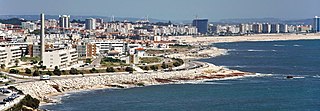
Figueira da Foz, also known as Figueira for short, is a city and a municipality in the Coimbra District, in Portugal. Practically at the midpoint of the Iberian Peninsula's Atlantic coast, it is located at the mouth of the Mondego River, 40 km (25 mi) west of Coimbra and sheltered by hills, sharing about the same latitude with Philadelphia, Baku and Beijing. The population of the municipality in 2011 was 62,125, in an area of 379.05 km2 (146.35 sq mi). The city of Figueira da Foz proper has a population of 46,600. It is the second largest city in the district of Coimbra.
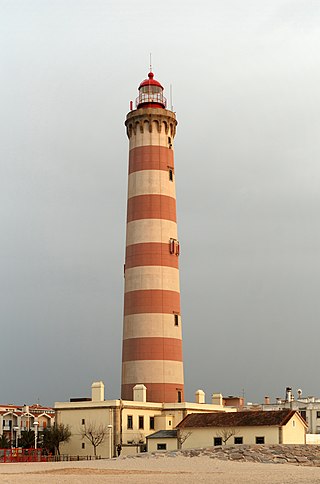
The Lighthouse of Praia da Barra, also known as the Aveiro Lighthouse, is an active lighthouse in the civil parish of Gafanha da Nazaré, municipality of Ílhavo, in the Portuguese district of Aveiro. Situated on the coastal Praia da Barra, at the southern margin of the Ria de Aveiro, it is the tallest lighthouse in Portugal, with a height of 203 feet (62 m) overseeing the barrier beach and exposed to Atlantic storms. It is open to the public and visits are held on Wednesdays from 14:00 to 17:00.

Cabo Mondego is a cape located in central western Portugal bordering the Atlantic Ocean. It is the westernmost point of the Serra da Boa Viagem and is located three kilometers north of Figueira da Foz. It is classified as a natural monument since 2007.

The Lighthouse of Ponta de Sagres, is beacon/lighthouse located along the coastal peninsula of Sagres Point in the civil parish of Sagres, in the Portuguese municipality of the Vila do Bispo.

The Castle of Redondos is a medieval castle located in the civil parish of Buarcos, in the municipality of Figueira da Foz, Portuguese Coimbra.
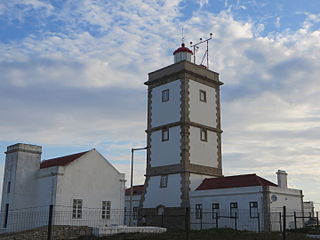
The Lighthouse of Cabo Carvoeiro is an active lighthouse in the civil parish of Peniche, municipality of the same name, in the Portuguese district of Leiria.
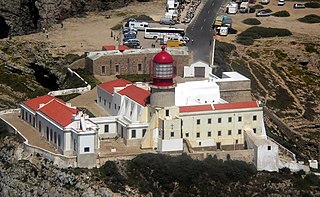
The Lighthouse of Cabo de São Vicente is a beacon/lighthouse located along the coastal peninsula of Sagres Point in the civil parish of Sagres, in the Portuguese municipality of the Vila do Bispo. Not to be confused with the Lighthouse of Ponta de Sagres, which is the located further to the edge of the extreme southwest cape of the civil parish, southwest of the Fortress of Sagres.
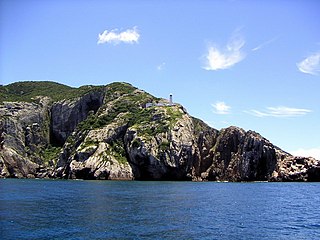
Cabo Frio Lighthouse is an active lighthouse located on the southern point of the Ilha do Cabo Frio, called Focinho do Cabo, in the municipality of Arraial do Cabo, Brazil.
Ilha da Moela Lighthouse is an active lighthouse on the namesake island 1.84 kilometres (1.14 mi) from Ponta do Munduba at the entrance of Santos Bay, Brazil. Ilha da Moela Lighthouse is the oldest lighthouse on the State of São Paulo coast and the entire island is a Brazilian Navy base.

Ilha Rasa Lighthouse is an active lighthouse on the namesake island located 11 kilometres (6.8 mi) from Guanabara Bay, Rio de Janeiro, Brazil.

The Guia lighthouse is an active Portuguese lighthouse located at Cabo da Guia, about 2 km west of the centre of Cascais. It is an octagonal tower in white masonry with a red lantern that has a range of 18 nautical miles.

Cape Espichel Lighthouse is situated on the western coast of the civil parish of Castelo, municipality of Sesimbra, in the Setúbal district of Portugal. The lighthouse was built in 1790.
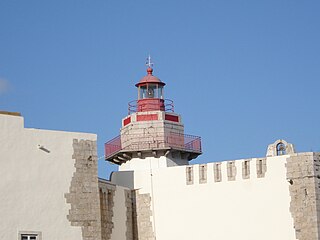
The Outão Lighthouse is located in the coastal Fort of Santiago do Outão, on the right bank of the narrow estuary of the River Sado, to the west of Setúbal in Portugal.

The Penedo da Saudade Lighthouse is located on the Atlantic coast in São Pedro de Moel, District of Leiria, Portugal. The functioning lighthouse was built in 1912 and takes its name from the cliff on which it was constructed.

The Sines Lighthouse is located at Cabo de Sines, in Sines, in the Setúbal District of Portugal. It is a 22-metre high white cylindrical tower with a red beacon.

The Ponta do Altar Lighthouse is located in the Ferragudo parish of the Lagoa municipality in the Faro District of Portugal.

Fort Santa Catarina of Figueira da Foz is located in the parish of Buarcos, in the city and municipality of Figueira da Foz, district of Coimbra, in Portugal.
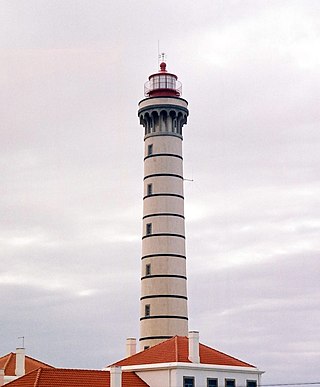
The Leça Lighthouse, also known as the Farol de Boa Nova, is a lighthouse on the Atlantic coast located in Leça da Palmeira, in the municipality of Matosinhos in the Porto District of Portugal. It is the second-tallest lighthouse in Portugal.

The Serreta Lighthouse, is located on top of a cliff, on the Ponta do Queimado, in the parish of Serreta, on the northwest coast of Terceira Island, in the Azores, Portugal. There have been four different lighthouses on this site, the most recent being a 14-metre-tall white with red horizontal bars fibreglass tower, equipped with a fifth-order optical device, powered by solar energy. It is situated within the Nature Park of Terceira.




















